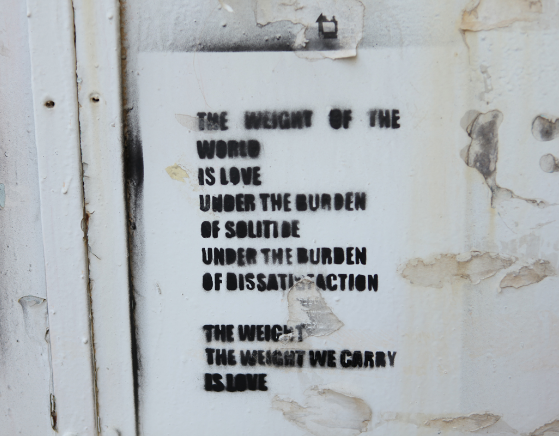The Growing Edge of a Poet.

{source}
“Follow your inner moonlight; don’t hide the madness.” ~ Allen Ginsberg
At 12 years old, with apparently no outside urging, I began to write poems.
I was honestly an odd child, at once engaging, and then isolative as a monk. I was a baseball-cap-wearing mystic. See, I had already begun to hide my poet, and present the persona of a tomboy, with crooked bangs, blue eyes, and a directiveness that was beyond my years and still remains today.
For a while my poems were short poems, shaped like crosses, every one of them.
I had not yet decided on whether I was a poet or a mystic, not realizing I could be both. My creative writing teacher at school recognized something in me and took me on as a kind of project. He convinced me to branch off of the structure of my poems, while he skillfully engaged and helped to grow my poetry.
At 14, I was a poet. Oh, yes, the full identity, like only a teenager can do.
It is at this point that I began to build my skill and my intuition, as well as the beginnings of a true poetic voice and vision, all so vital for poetry. Robert Graves stated, “To be a poet is a condition, not a profession.” It certainly became my condition. I wrote poetry everywhere, including the back of my hand, and my bedroom wall.
My family life was pure madness, a foreshadowing of what would later overcome myself. Lord Byron said, “The great art of life is sensation, to feel that we exist, even in pain.” Pain was certainly a measure of my existence at this point. Poetry remained a constant. Strangely, still, it rarely was written on paper. I would have been a great spoken word poet or graffiti artist, if those had been options.
Later in my teens and into college, people began to worry about me. I was still writing, but my self had changed drastically. I was withdrawn, and interacted with poetry, not people. John Milton said, “The mind is its own place, and in itself can make a heaven of hell, a hell of heaven.” My mind was in hell. My writing became increasingly dark.
An editor of my college poetry journal loved this new “depth” poet. He did not realize that I was drowning, and I could barely string words together into poems. He touted this poetry as “alternative,” unknowingly supporting what was to become mental illness.
So, in my senior year of college, I ended up in a psychiatric hospital with my first diagnosis of bipolar disorder. I pulled myself together, in part, by writing poetry that urged me to pick up my life and move forward, learning over time to live with a chronic mental illness. I graduated college while on a psychiatric unit with highest honors. It was the start of a journey of learning to live well with bipolar disorder.
This was, and continues to be, a journey that I would never make without poetry.
Poetry is at the center of my life. It helps me fight off episodes of my illness, and is a foundation of healing and expression that helps keep me healthy.
“Find out the reason that commands you to write; see whether is has spread its roots into the very depth of your heart; confess to yourself you would have to die if you were forbidden to write.” ~ Rainer Maria Rilke
And I would die, no doubt, if I were forbidden to write.
***
Marie Turco is a poet who branches off into prose and prose poems. Honestly, poet is the word that best defines her. Trying to cut out the distractions as much as possible but needing to pay rent, she is also a psychotherapist.
***
{Join us on Facebook, Twitter, Instagram & Pinterest}

